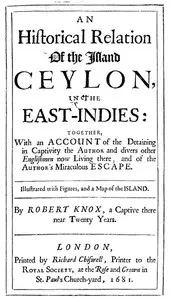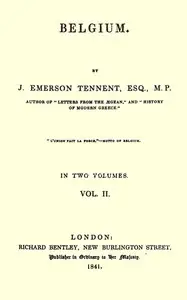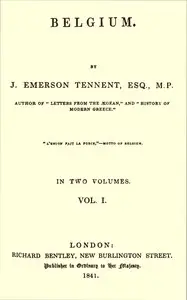"Ceylon; an Account of the Island Physical, Historical, and Topographical" by Sir James Emerson Tennent is an extensive historical narrative that explores the diverse facets of Ceylon (present-day Sri Lanka) in the mid-1800s. The book provides a sweeping look into Ceylon’s physical landscape, past events, and its place in the natural order, alongside its cultural importance, revealing the island's captivating beauty, encompassing its verdant scenery and varied terrain. It recalls the historical views from groups like people of India who practice Hinduism and the ancient Greeks, highlighting the island's importance in geography and its celebrated status as a place filled with wonder and riches. Tennent provides glimpses of Ceylon's societal and economic changes across time, paving the way for a more throughout investigation of its geology, environment, and the deep connection between its people and their homeland, as the narrative progresses.

Ceylon; an Account of the Island Physical, Historical, and Topographical with Notices of Its Natural History, Antiquities and Productions, Volume 1
By James Emerson Tennent
Discover an island paradise of lush landscapes and rich history, where ancient cultures intertwined with the natural wonders of Ceylon.
Summary
About the AuthorSir James Emerson Tennent, 1st Baronet, FRS was a Conservative Member of the United Kingdom Parliament for the Irish seats of Belfast and of Lisburn, and a resident Colonial Secretary in Ceylon. Opposed to the restoration of a parliament in Dublin, his defence of Ireland's union with Great Britain emphasised what he conceived as the liberal virtues of British imperial administration. In Ceylon, his policies in support the growing plantation and wage economy met with peasant resistance in the Matale Rebellion of 1848. In recognition of his encyclopedic surveys of the colony, in 1862 he was elected a Fellow of the Royal Society.
Sir James Emerson Tennent, 1st Baronet, FRS was a Conservative Member of the United Kingdom Parliament for the Irish seats of Belfast and of Lisburn, and a resident Colonial Secretary in Ceylon. Opposed to the restoration of a parliament in Dublin, his defence of Ireland's union with Great Britain emphasised what he conceived as the liberal virtues of British imperial administration. In Ceylon, his policies in support the growing plantation and wage economy met with peasant resistance in the Matale Rebellion of 1848. In recognition of his encyclopedic surveys of the colony, in 1862 he was elected a Fellow of the Royal Society.
















